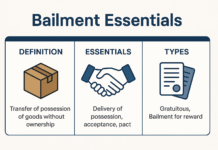What is “condition and warranty’? Distinguish them too. When condition by treated as warranty? Discuss with Illustrations.
In any contract for the sale of goods, various terms and stipulations are agreed upon between the buyer and the seller. These terms can relate to the quality, nature, fitness, and other aspects of the goods. However, not all these terms carry the same weight. Some are fundamental to the very essence of the contract, while others are of secondary importance. The Sale of Goods Act distinguishes between these terms as “conditions” and “warranties,” and understanding this distinction is crucial for determining the rights and remedies available to the parties in case of a breach.
Defining Condition (Section 12(2))
According to Section 12(2) of the Sale of Goods Act, “A condition is a stipulation essential to the main purpose of the contract, the breach of which gives rise to a right to treat the contract as repudiated.“
In simpler terms, a condition is a fundamental term that goes to the root of the contract. Its fulfillment is so vital that if it is not met, the buyer can consider the entire contract broken and refuse to accept the goods or can return them and claim a refund of the price. The non-fulfillment of a condition essentially defeats the very purpose for which the buyer entered into the contract.
Illustration 1 (Based on Baldry v. Marshall):
Suppose Mr. A consults a car dealer, Mr. B, stating he needs a car “suitable for touring purposes.” Mr. B recommends a “Bugatti” car, and Mr. A buys it based on this suggestion. However, the car turns out to be completely unsuitable for touring. In this scenario, the suitability of the car for touring purposes was a condition of the contract. It was a stipulation essential to the main purpose for which Mr. A bought the car. Since this condition was breached, Mr. A has the right to reject the car and claim a refund.
Illustration 2:
If Ms. X sells a quantity of foodstuffs to Mr. Y, there is an implied condition (even if not explicitly stated) that the food will be fit for human consumption. If the foodstuffs are found to contain a poisonous substance, this breach of condition allows Mr. Y to reject the goods and repudiate the contract.
Defining Warranty (Section 12(3))
Section 12(3) of the Sale of Goods Act defines a warranty as, “A warranty is a stipulation collateral to the main purpose of the contract, the breach of which gives rise to a claim for damages but not to a right to reject the goods and treat the contract as repudiated.“
A warranty is a term that is of secondary importance compared to a condition. It is not as vital to the core purpose of the contract. If a warranty is breached, the buyer cannot reject the goods or repudiate the contract. Their remedy is limited to claiming damages (monetary compensation) from the seller for the loss suffered due to the breach. The contract itself remains valid.
Illustration 3:
Continuing with the foodstuff example, suppose Ms. X contracted to deliver the foodstuff in one-kilo boxes, but instead, delivers them in half-kilo boxes. This breach of the stipulation regarding the packaging is likely a warranty. While Mr. Y might have a claim for damages due to the inconvenience of dealing with smaller boxes, he generally cannot reject the entire consignment of foodstuff on this ground alone. The main purpose of the contract (the sale and purchase of edible foodstuff) is still fulfilled.
Determining Condition or Warranty (Section 12(4))
Section 12(4) provides an important guideline: “Whether, a stipulation in a contract of sale Is a condition or a warranty depends in each case on the construction of the contract. A stipulation may be a condition though called a warranty in the contract.“
This means that the court will look at the substance and intent of the term, rather than just the label given by the parties. The court will assess the relative importance of the stipulation in dispute based on all the surrounding circumstances, including the intention of the parties at the time of the contract. A term that is crucial to the fundamental purpose of the contract will be treated as a condition, even if the contract mistakenly labels it as a warranty.
Distinction Between Condition and Warranty
The following table summarizes the key differences between a condition and a warranty:
| Feature | Condition | Warranty |
| Importance to the Contract | Essential to the main purpose of the contract; forms the foundation of the agreement. | Collateral to the main purpose of the contract; a subsidiary part of the agreement. |
| Impact of Breach | Gives the injured party (usually the buyer) the right to repudiate the contract (reject the goods and claim a refund) and/or claim damages. | Gives the injured party (usually the buyer) the right to claim damages only; the buyer cannot reject the goods or repudiate the contract solely based on its breach. |
| Effect on Transfer of Ownership (Generally) | Non-fulfillment of a condition may prevent the transfer of ownership as intended by the contract. | Breach of a warranty generally does not affect the transfer of ownership, which usually occurs as per other terms of the contract. |
| Treatment by Buyer | Buyer has the option to treat the breach of a condition as a breach of warranty and claim damages instead of repudiating the contract. | Buyer has no option to treat the breach of a warranty as a breach of condition. Their remedy is limited to damages. |
When Condition is Treated as Warranty (Section 13)
In certain circumstances, a breach of condition may be treated as a breach of warranty. This typically happens when the buyer chooses to waive their right to repudiate the contract. According to Section 13 of the Sale of Goods Act, a condition is treated as a warranty in the following situations:
- Where the buyer wholly waives the performance of the condition. The buyer may voluntarily choose to forgo the fulfillment of the condition. For example, if a car was supposed to have leather seats (a condition), and the buyer accepts it with fabric seats, they have waived the condition.
- Where the buyer elects to treat the breach of the condition as a breach of warranty and claims damages instead of repudiating the contract. Even if a fundamental condition is breached, the buyer might still want to keep the goods and only seek monetary compensation for the defect or non-conformity.
- Where the buyer has accepted the goods or part thereof. Once the buyer has accepted the goods (as defined in Section 42 of the Act), the breach of a condition can only be treated as a breach of warranty, and the right to repudiate the contract is lost. Acceptance usually implies that the buyer has had a reasonable opportunity to examine the goods and has either intimated to the seller that they have accepted them, or has done an act inconsistent with the ownership of the seller, or has retained the goods beyond a reasonable time without intimating rejection.
Illustration 4:
Suppose Mr. Z buys a specific type of machine from Ms. W, with a condition that it must have a particular processing speed. Upon delivery, Mr. Z discovers that the machine’s speed is lower than specified. This is a breach of condition, giving Mr. Z the right to reject the machine. However, if Mr. Z decides that the slower speed is still acceptable for his needs and chooses to keep the machine, claiming damages for the reduced efficiency, the condition is treated as a warranty.
Illustration 5:
If Mr. Z, in the previous example, uses the machine for a significant period without informing Ms. W about the speed issue, he might be deemed to have accepted the goods. In this case, he loses his right to reject the machine and can only claim damages for the breach of the original condition (now treated as a warranty).
Conclusion
The distinction between a condition and a warranty is fundamental to understanding the rights and obligations of buyers and sellers in a contract for the sale of goods. A condition is a crucial stipulation, the breach of which can lead to the repudiation of the contract, while a warranty is a less vital term, the breach of which only entitles the buyer to damages. Importantly, the law looks at the essence of the term rather than its label, and in certain situations, a breach of condition can be treated as a breach of warranty, primarily when the buyer chooses to accept the goods or waive their right to reject them. A clear understanding of these concepts is essential for navigating the complexities of commercial transactions and ensuring fair outcomes for all parties involved.






![Maneka Gandhi v. Union of India [1978] 2 SCR 621: A Watershed Moment in Indian Constitutional Jurisprudence](https://www.infipark.com/articles/wp-content/uploads/2026/02/Image-Feb-18-2026-10_47_59-AM-218x150.jpg)









